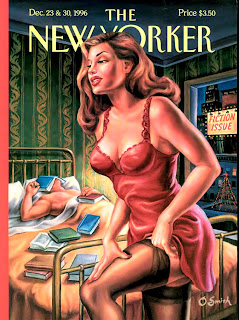“Owen Smith’s illustration clients include Sports Illustrated, Time, Rolling Stone, and The New Yorker, for which he has created 15 cover illustrations. He has recently completed work on a new children’s book for Simon and Schuster.Every one of Smith’s illustrations is rich with detail. In many he has a noirish view of violence either happening or about to happen. I can look at his pictures and design my own stories around them.
Owen’s influences come from the WPA artists of the 1930s, Diego Rivera, and the lurid covers of pulp magazines and dime-store paperbacks of the 1930s and 1940s. His paintings have been featured in exhibitions in New York, Rome, and Milan as well as solo shows in Los Angeles. In 1998 a set of mosaic murals Owen designed was permanently installed in a New York subway station at 36th Street in Brooklyn.
Currently Owen is designing permanent art for a historic San Francisco hospital, including murals, mosaic, and relief sculpture.”
The latest New Yorker cover is something of a change of pace for Smith, illustrating a current news story that floated around a few weeks ago. New York City's Mayor Bloomberg wanted to ban 32-ounce cups of soda, claiming they contribute to obesity. In Smith's illustration a couple has broken the law over a jumbo-sized beverage.
Most of Smith's cover assignments for The New Yorker have been for their fiction issues. He's done other subjects as well, but the fiction issue covers are the ones I like best.
Covers Copyright © 2012 The New Yorker
















3 comments:
Karen and I love his work. I have a great CD by Amiee Mann that he illustrated. Thanks for showing more of his work. I wonder if a book of collected works will be published?
Great stuff.
I haven't seen every cover of the 1930s New Yorker, but I don't think they would have let this type of art on their covers back them, seeing as they were trying to distance themselves from the pulp fiction of the day. Goes to show you, it just takes a little passage of time before a certain style or art is appreciated by the highbrows.
Dave, I haven't seen the Aimee Mann CD, so thanks for letting me know about it.
Kirk, maybe this all started with Roy Lichtenstein in the '60s...beaming pop culture back to the highbrows, making it acceptable.
Post a Comment